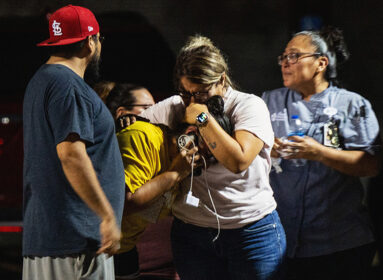
A son writes about the remarkable life and career of his inspiring – and inventive – father
By Cindy Mindell
WEST HARTFORD – A Holocaust survivor whose early experiences shaped his ethos of invention, H. Joseph Gerber became known as the “Thomas Edison” of manufacturing, pioneering important developments in engineering, electronics, printing, apparel, aerospace, and many other areas, and playing an essential role in the transformation of American industry.
In 1948, Gerber, who lived in West Hartford, founded Gerber Scientific Instrument Co. to support his invention of a variable scale, the first of 675 patents he would eventually hold. Today, the scale, along with other of his inventions, is part of the permanent collection at the Smithsonian Institution’s National Museum of American History.
In 1994, President Bill Clinton presented Joseph Gerber with the National Medals of Technology and Science at a ceremony at the White House in Washington D.C.
The extraordinary life and career of the iconic 20th century inventor, technologist, and business magnate, who died in 1996 at the age of 72, is described in The Inventor’s Dilemma: The Remarkable Life of H. Joseph Gerber (Yale University Press, 2015), written by his son, David, and based on unique access to unpublished sources.
David J. Gerber has been a fellow at the Yale School of Management and has handled legal, technical, and business responsibilities for Gerber Scientific as an officer and a director. He lives in West Hartford, where he was raised. He spoke with the Ledger about the forces that inspired and shaped his father’s many achievements, and about how both his parents contributed to the Greater Hartford Jewish community.
Q: Can you describe in brief the arc of your father’s journey from Austria to West Hartford?
A: The morning after the Nazi takeover of Vienna, my grandmother went to the American Consulate to obtain an immigration registration number and apply for a visa. The visa wasn’t granted until two years later, in 1940, when they managed to get out of the country with only five Marks. During those two years, my dad and his family hid, endured, and schemed. My dad was sent to a labor camp for a while. He and his father escaped to Switzerland, only to be captured, jailed, and turned over to the Gestapo. My dad’s father was later transported to German-occupied Poland, where he died.
Q: How did your father’s background fuel his path in science and business?
A: My dad was a born inventor. As a boy, he programmed his violin to play itself. When the Nazis came to power, he turned his inventive talents to solving important problems. For example, the Gestapo put my dad and his father on a train headed toward Dachau, but my dad figured out a way to disengage a latching mechanism on their train car, and they jumped from the train. Back in Vienna, his family needed accurate news as they strategized how they could gain entry to other countries; my dad amplified the reception on their radio, so they could hear foreign news broadcasts. When his father was sent to Poland, my dad built and gave him a portable hand-warmer from a kerosene stove. He’d been raised with an ideal to contribute to society with his natural inventive talents. Nazi rule undermined this ideal, with their use of technology for evil and disintegration of society for Jews. But in America, my dad found the society he wanted. The Holocaust also changed my dad’s view of risk and time. If he didn’t take risks, and act when a door of opportunity opened for a moment, he would die.
Q: What was your father’s Jewish life like in Austria and in West Hartford?
A: The Vienna of my dad’s childhood – the 1930s – was incredibly complex. Jews rose to prominence in many professions and played a crucial role in the birth of modernism, but antisemitism grew increasingly rabid, even before the Nazi takeover, due to the post-World War I economic depression. Vienna was the birthplace of Hitler and Herzl.
With Nazi rule, life for Jews became brutish. Antisemitic restrictions, which gradually increased in Germany since 1933, were imposed overnight in Austria in 1938. Society vanished for the Jews as though it never was really there.
In Hartford, my dad found a strong Jewish community. He attended services at The Emanuel Synagogue regularly on Friday nights, listening with great attention to the sermons. He encountered kindness, but also naiveté about what was happening in Europe. A social worker assigned to him thought he was inventing the stories about camps and brutality, and questioned his sanity.
Q: What inspired you to write your father’s biography?
A: I was privy to this incredible story, and wanted to explore and share it. My dad survived the Holocaust, rose from a penniless refugee, and became a celebrated inventor who transformed numerous industries. You have to ask yourself: How did he accomplish so much? He was an idealist. He found joy in inventing and sought to contribute to society, to give back to the country that had taken him in. After all he’d experienced in Europe, how did he remain idealistic?
My dad’s story is about the transformation of industries and the transformation of a man. I had to think through these seemingly separate stories deeply until I came to see how these were so interwoven as to be a single story.
Q: Your mother, Sonia Gerber z”l, was deeply involved in the Jewish community, especially in arts-related endeavors. What motivated this dedication?
A: My mom’s parents were Zionists. As I wrote in my book, if my dad was a “European-born Yankee,” my mom was an “American-born Sabra.” She posted Israel-statehood billboards along the East Side of Manhattan, danced in Times Square when the state was recognized, and toured Europe as an Israeli beauty queen to raise money for the state in 1952. She also was raised with a love of the arts in Manhattan, and was creative in her own right. My dad was her fourth “date” of the day when they met. He quickly realized she was artistically inclined, so he told her he was a “mathematical philosopher” – instead of an “engineer.” In Hartford, she taught arts in elementary school. Later, she was involved in the Wadsworth Athenaeum’s Gallery of the Senses for the blind. She was very involved in the JCC and its Ann Randall Arts Committee, and she led art tours in Israel.
Q: What do you see as your father’s legacy?
A: My dad played a vital role in modernizing American manufacturing, touching upon the products people use every day: cars, clothes, electronics, shoes, eyeglasses, packaging, signs, and more. In each of these industries, he and his company introduced the first computer-automated manufacturing systems, which he and others built upon. As a result of computer automation, products are cheap and abundant. Wardrobes are big. We don’t darn or mend. Personal electronic devices are ubiquitous. Signs and billboards are photographic, not the prosaic ghosted letters on barns and brick walls. We fly on jumbo jets. We get eyeglasses at the mall in an hour.
As a Jewish-American, he contributed to both American productivity and to Israel’s independence. He joined a high-tech startup in Beersheba as early as 1968. His life story also points to an additional piece of meaning in the Holocaust history, an optimistic bent, if I may say that. His story underscores the relationship between imagination and hope: a boy who uses his inventive acumen to survive; a refugee who envisions a future for himself and invents a “revolutionary” engineering tool from the pajamas his father gave him back in Europe; an industrialist whose technology gives hope to declining industries; an old man who finds an answer to the questions that gripped him as a boy: Why the Jews? What is a Jew? For him, this answer was that something in the Jewish character doesn’t accept the given, with important but dangerous effects. In a way, I suppose that he was like his Biblical namesake, Joseph, ostracized and endangered, sent to a foreign land, where he rose to prominence through dreams.
My dad’s path influenced mine; he taught me to enjoy creative challenges. He and my mother showed me how to be a son and a father.
David Gerber will discuss his book on Tuesday, April 19, 7 p.m. at the Mandell JCC, 335 Bloomfield Ave., West Hartford. Admission is free. Registration required: (860) 231-6316, jziplow@mandelljcc.org.
Joe Gerber: Life in Hartford
 In his book, The Inventor’s Dilemma: Remarkable Life of H. Joseph Gerber, David Gerber recounts how, upon arriving in America in 1940, Joe Gerber and his mother, Bertha, rented a room on Manhattan’s Yorkville section — a German-speaking neighborhood that seemed more like Berlin or Nuremberg than Anytown, USA. But Joe wanted to live as an American. He wanted to find a place where he could dissolve into the American mainstream. In this excerpt from his book, David Gerber describes how his father came to live and thrive in Hartford.
In his book, The Inventor’s Dilemma: Remarkable Life of H. Joseph Gerber, David Gerber recounts how, upon arriving in America in 1940, Joe Gerber and his mother, Bertha, rented a room on Manhattan’s Yorkville section — a German-speaking neighborhood that seemed more like Berlin or Nuremberg than Anytown, USA. But Joe wanted to live as an American. He wanted to find a place where he could dissolve into the American mainstream. In this excerpt from his book, David Gerber describes how his father came to live and thrive in Hartford.
Joe studied the New York German-Jewish newspaper Aufbau and consulted with counselors at HIAS, who encouraged Jewish immigrants to move to smaller cities around New York to diffuse the impact of the influx. He and Bertha selected Hartford, Connecticut. It was distant from the European influence, but close enough to New York City that they could return in case of failure. The tobacco farms outside Hartford hired workers as young as sixteen to pick leaves. If he and Bertha left in June, he could earn $12.50 a week in good weather. They found a one-room sublet in Hartford’s north end, with two beds and the provision of evening meals. Their room was in a three-story house at 70 Greenfield Street, a street lined with arching elm trees, children congregating on the stoops, and half-open windows with fluttering lace curtains. Their room was bright and pleasant, even though Bertha and Joe were rarely there: Bertha worked six days a week at a local department store, and Joe left at 5:00 a.m. for the tobacco fields.
In the fields, shade tobacco grew under netting, where the temperature could reach 120º and the air was foul. Joe dragged his leaf- carrying sled between the fields and the curing shed, happy to feel the sun on his face. In the rows of leafy plants, under the white cloth netting that billowed in summer breezes, he felt his fatigue and panic dim. The quiet countryside soothed his raw psyche. One day, coworkers stole the lunch of a Jewish immigrant from Linz, a boy Joe’s age named John Fried. Joe gave John half of his own sandwich, and the next day, when those thuggish coworkers returned, the two friends together fought them off.
After work, Joe returned to Hartford by bus and then took a shortcut through Hartford’s Keney Park along the tree-lined paths and fields. At the southern edge of the park, a trimmed lawn sloped upward to the entrance of the large brick edifice of the Weaver High School. Students in small groups — girls in neat pleated skirts and bobby socks, boys in letter jackets with books in satchels — stood in the arched doorways, and athletic fields stretched to one side. Each day, as Joe passed the school, he calculated. He had tried taking classes at night, but several years of such schooling would be required to complete a year of regular high school.
He decided to save enough money during the 1940–41 academic year so that, when he restarted school, he could continue without interruption.
At home, he cleaned an empty soup can, soldered its top closed, and slit it to make a bank. After the summer’s picking season, he found jobs as a busboy, bakery clerk, meat cutter, and freight handler. He washed windows on weekends and repaired radios for his Greenfield Street neighbors at night. One spring evening, as he and his mother passed the park in front of the high school, they saw boys and girls dressed in formal wear for the school prom. He watched them entering the gym to the sound of music, hoping that he would soon be able to join them and thereby “reset” his life.
CAP: Joseph and Sonia Gerber with their children, David and Melisa, in 1994, when Joe received the National Medal of Technology and Innovation from President Bill Clinton, who in presenting the award cited Gerber “for his past and continuing technical leadership in the invention, development and commercialization of manufacturing automation systems for a wide variety of industries – most notably apparel – which have made those industries more efficient and cost effective in today’s worldwide competitive environment.”








 Southern New England Jewish Ledger
Southern New England Jewish Ledger










